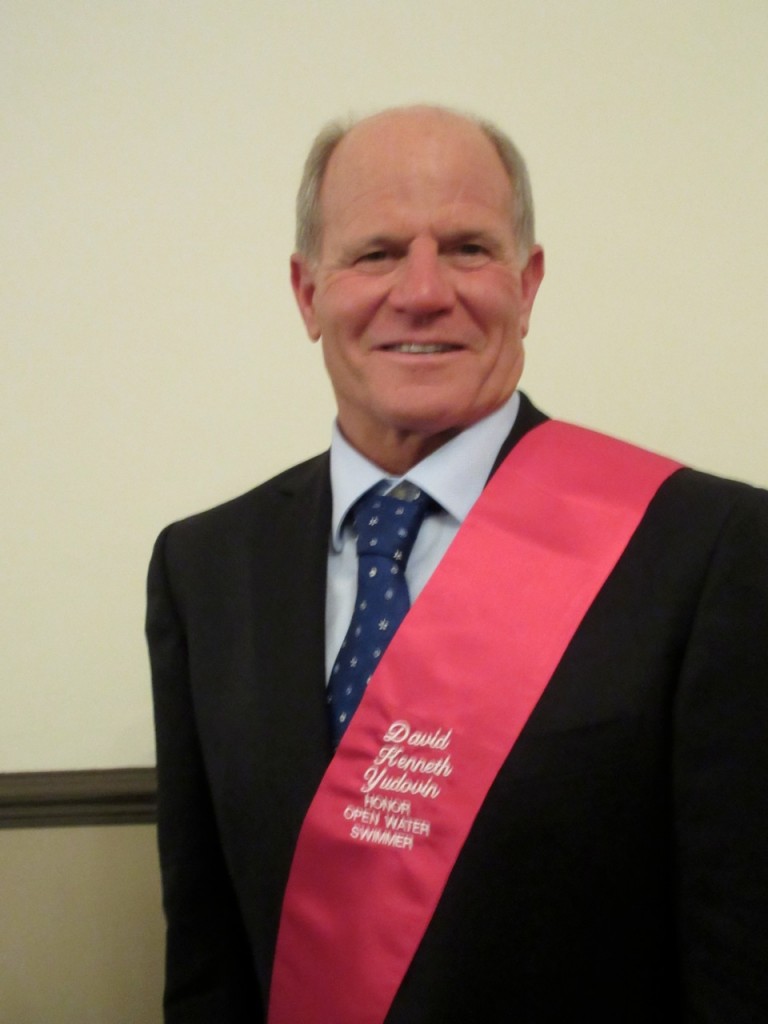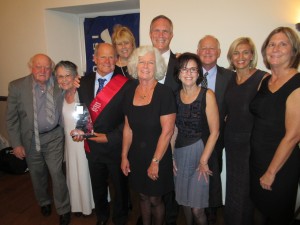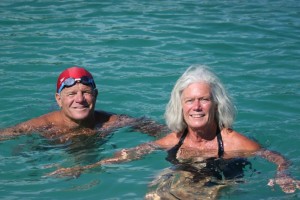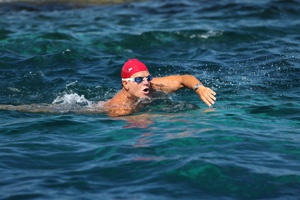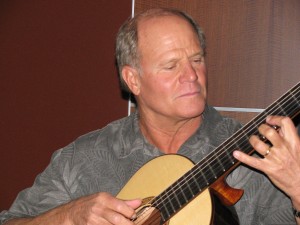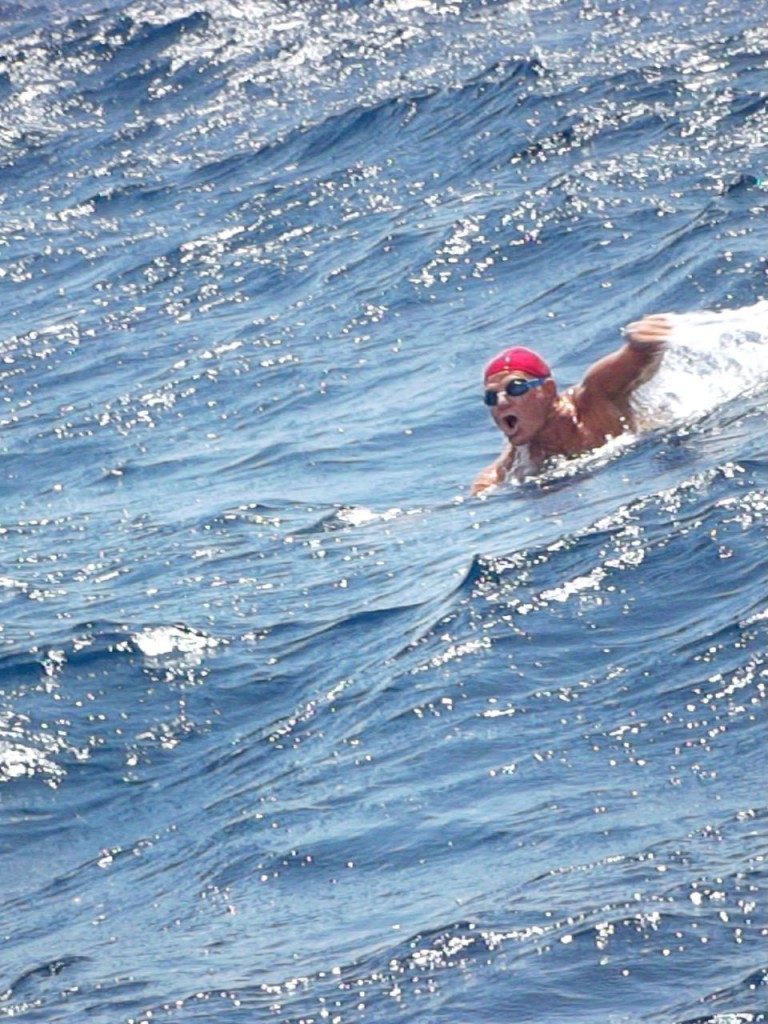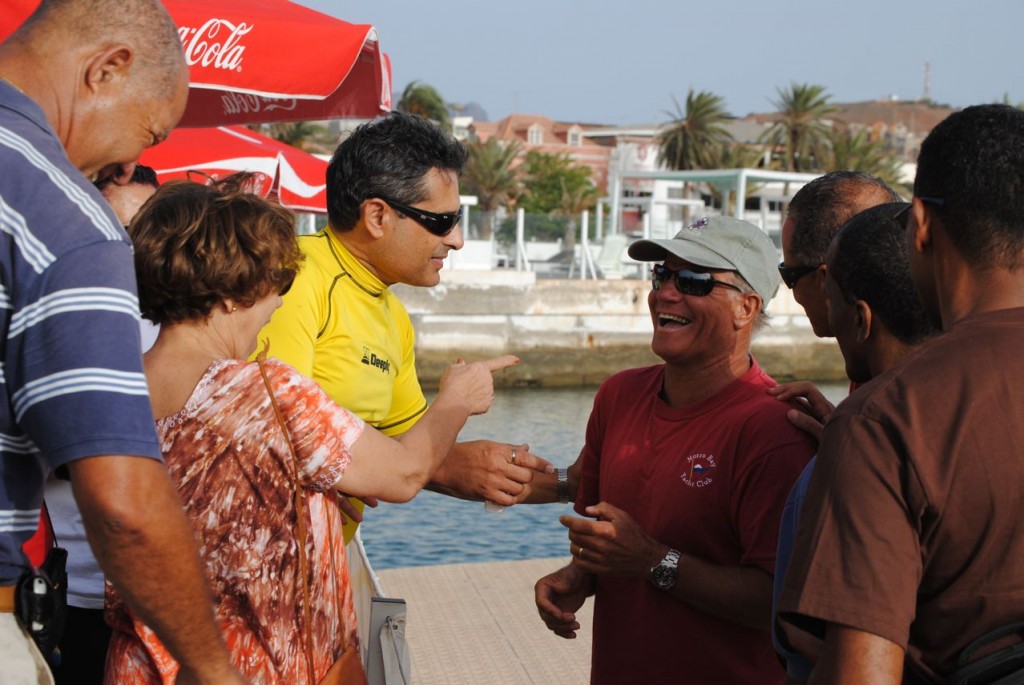David Yudovin, Ocean Pioneer Extraordinaire, Passes Away
Courtesy of WOWSA, Huntington Beach, California.
Dale Petranech reported that International Swimming Hall of FameHonor Open Water Swimmer David Yudovin unexpectedly passed away from a heart attack.
As a major benefactor of the sport, a quiet inspirational icon among channel swimmers and the head and visionary of the International Marathon Swimming Hall of Fame, Yudovin will be missed by many around the world. “He is unreplaceable,” writes Petranech. “But as a tribute to David, the International Marathon Swimming Hall of Fame board of directors will keep as many of his plans for the IMSHOF in place.”
English Channel and Catalina Channel record holder Penny Dean recalls her fellow Hall of Fame dual inductee, “The open water swimming community just lost the man with the most gentle heart and soul who had just committed himself and his wife Beth to improve the recognition of marathon swimming and its athletes and organizations worldwide, especially the Hall of Fame.”
Scott Zornig who worked with Yudovin at the Santa Barbara Channel Swimming Association, “Dave was not only one of the greatest marathon swimmers ever who quietly conquered over 40 channels, but he was a coach, mentor, and friend. Dave’s heart was even bigger than his swims as he continually gave of himself to the sick and less fortunate. I will never forget his kindness nor his love of our sport. Dave showed us that speed is irrelevant. Rather, it is far more important to overcome obstacles and complete the journey.”
Yudovin was one of the most prolific ocean marathon swimmers in history, known for pioneering dozens of channel swimming firsts that literally span the globe. A successful entrepreneur in the seafood industry in California, Yudovin began channel swimming in 1976 and remained extraordinarily active in the sport for nearly 40 years.
From lending his experience and expertise to the Catalina Channel Swimming Federation and Santa Barbara Channel Swimming Association to giving motivational speeches to various groups, he opened the eyes of many locally, regionally and internationally with his open water swimming exploits, but also because of his humble and passionate nature.
Over the course of his career, Yudovin completed over 35 solo marathon channel swims that include over 15 unprecedented swims. “He was the first to cross the Tsugaru Channel in northern Japan on July 7th, a day with a special meaning in Japan,” says Steven Munatones who wrote many articles about his exploits. “That is who David was – someone special, very special. Every time, David sent the Daily News of Open Water Swimming an email, it always contained a pleasant surprise. He was somewhere in the world, far away from home either planning or completing an unprecedented swim, usually in very tough conditions. He was a pioneer extraordinaire.” Together with his wife Beth, Yudovin raised funds for the City of Hope Cancer Center, Senior Nutrition, Cambria Community Bus, and North Coast Ocean Rescue, Cambria Fire Department and was right in the middle of
His marathon and channel swims included the following:
- 1976 – Catalina Channel (20.2 miles) 11 hours 51 minutes
- 1982 – Anacapa Island Channel (11nm) 8 hours 27 minutes
- 1983 – Santa Cruz Island Channel (16 nm) 15 hours 15 minutes – 1st
- 1984 – North Coronado Island to Mexico (11 nm) 6 hours 22 minutes – 1st
- 1985 – Morocco to Gibraltar (11 nm) 9 hours 27 minutes
- 1986 – California Channel (20.2 miles) 13 hours 45 minutes
- 1990 – Tsugaru Channel (Honchu-Hokkaido) (17 nm) 11 hours 54 minutes – 1st
- 1991 – South Coronado Island to Mexico (8.5 nm) 4 hours 6 minutes
- 1991 – North Coronado Island to Mexico (11 nm) 7 hours 45 minutes – 1st
- 1992 – South Coronado Island to Mexico (8.5 nm) 4 hours 20 minutes
- 1992 – South Coronado Island to Mexico (8.5 nm) 4 hours 25 minutes
- 1993 – South Coronado Island to Mexico (8.5 nm) 4 hours 15 minutes
- 1993 – Catalina Channel (20.2 miles)
11 hours 49 minutes - 1995 – Catalina Channel (20.2 miles)
10 hours 46 minutes - 1996 – English Channel (18 nm)
13 hours 37 minutes - 1996 – Bali to Java (6 nm)
1 hours 36 minutes – 1st - 1997 – Nusa Penida to Bali (9 nm)
2 hours 48 minutes – 1st - 2000 – Indonesia’s Sunda Strait, Java to Sumatra (15 nm)
10 hours 34 minutes – 1st - 2002 – Maui Channel (Lanai-Maui) (10 nm)
4 hours 47 minutes - 2002 – Molokini to Maui (5 nm)
2 hours 6 minutes - 2003 – Molokini to Maui (5 nm)
2 hours 16 minutes - 2003 – Maui to Molokai (10 nm)
4 hours 14 minutes - 2003 – Maui to Kahoolawe (8 nm)
4 hours 18 minutes - 2003 – Molokai to Lanai (10 nm)
5 hours 11 minutes - 2003 – Cape Wiwiki to Cape Brett, Bay of Islands, New Zealand (10 nm)
5 hours 23 minutes – 1st - 2004 – Cook Strait (North Island-South Island) (16 nm)
9 hours 38 minutes - 2008 – Moorea Channel, French Polynesia from Tahiti Island to Moorea Island (10 nm)
6 hours 20 minutes - 2008 – Faial Pico Channel, Azores from Faial Island to Pico Island, Portugal (5 nm)
2 hours 20 minutes – 1st - 2008 – Pico S. Jorge Channel, Azores from Pico Island to S. Jorge Island, Portugal (10 nm)
7 hours 26 minutes – 1st - 2008 – Corvo Floress Channel, Azores from Corvo Island to Flores Island, Portugal (10 nm)
7 hours 10 minutes – 1st - 2010 – Ihla Madeira Ihla Desertas Grande Channel, Madeira Islands from Ihla Madeira to Ihla Desertas Grande, Portugal (11 nm)
7 hours 3 minutes – 1st - 2011 – Sipika Island to Simaleko Island, North Sumatra, Indonesia (8 nm)
3 hours 59 minutes – 1st - 2011 – Telo Island to Sigata Island, North Sumatra, Indonesia (5 nm)
3 hours 36 minutes – 1st - 2011 – Tanah Masa Island to Pini Island. North Sumatra, Indonesia (11.5 nm)
7 hours 52 minutes – 1st - 2012 – Santo Antonio Island to San Vincente Island, Cape Verde, Africa (10.5 nm)
5 hours 44 minutes – 1st - 2012 – Fogo Island to Brava Island, Cape Verde, Africa (12.6 nm)
6 hours 38 minutes – 1st - 2013 – Maio Island to Santiago Island, Cape Verde, Africa (16 nm)
11 hours 37 minutes – 1st - 2013 – Simeleko Island to Tanahmasa Island, Baluta Beach, North Sumatra, Indonesia (4.85 nm)
3 hours 34 minutes – 1st - 2013 – Tanahmasa Island, Rangas Beach to Simeleko Island, North Sumatra, Indonesia (5.5 nm)
3 hours 33 minutes – 1st - 2013 – Telo Island to Sigata Island, North Sumatra, Indonesia (5.5 nm)
3 hours 40 minutes – 1st - 2013 – Pini Island to Laga Island, North Sumatra, Indonesia (7.5 nm)
5 hours 46 minutes – 1st - 2014 – Principe Island/Around Gale Rock Island/Principe Island Sao Tome, Africa (6 nm)
3 hours 55 minutes – 1st - 2014 – Isla Tinhosa Pequena/Principe Island, Sao Tome, Africa (5 nm)
6 hours 11 minutes
Among his legacies will be the Yudovin Award awarded by the Marathon Swimmers Federation as part of its MSF Global Marathon Swimming Awards. The Yudovin Award honors the single most adventurous swim of the year as voted upon by the MSF membership and is meant to recognize the spirit of adventure, the most interesting swim, or the most unusual swim – as was Yudovin’s speciality.
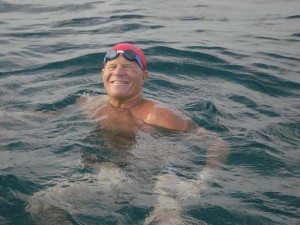
June 30, 2103 David Yudovin, 11 hours and 37 minutes marathon swim between Maio Island to Santiago Island, Africa 2013
The Daily News of Open Water Swimming covered Yudovin’s exploits with the following articles:
- David Yudovin Goes 3 For 3 In Cape Verde
- David Yudovin, Swimming Between Wild And Fire in Africa
- Marathon Swimming Along The Equator
- Swimming Strait – Tackling The Tsugaru
- International Marathon Swimming Hall of Fame Class of 2013
- Tackling The Tsugaru
- David Yudovin Crosses Canal de São Vicente
- David Yudovin Becomes Namesake For MSF Award
- David Yudovin Inspires The Yudovin Award
- The Perfect Male Open Water Swimmer
- Dreamers Are Driven
- Water Transforms David Yudovin
- Successful Swimming Strategies In The Far East
- The Ties That Bind In The Open Water
- Swimming In The World’s Greatest Wind Tunnel
- WOWSA, IMSHOF Heads To Cork, Ireland
- What Makes Great Swimmers?
- David Yudovin Voted In International Swimming Hall Of Fame
- International Swimming Hall Of Fame Open Water Greats
- Bali To Java, An American Favorite
- Yudovin Concludes 6-Year Journey In São Tomé, Príncipe
- 9 Accomplish Canal Faial Pico Crossing
- Crème de la Crème Of The Open Water World
- Go West To Swim North
- 9 Succeed In Nadar Açores Project Between Pico And Faial
- California Channel Island Swimming History 1926 to 1978
- Antecedent Attempts At Anacapa
- Negative Splitting Life In The Open Water
- So What Do You Do?
- 5,000 Reasons To Give Hope
- Open Water Swimming Heroes
Copyright © 2015 by World Open Water Swimming AssociationMarathon Swimmers Forum Calls For Nominations – 2014 Yudovin Award
In 2012, The Marathon Swimmers Forum started the MSF Global Marathon Swimming Awards with two categories:
- Solo Swim of the Year that will honor the single most outstanding marathon swim of the year.
- The Barra Award that will honor the most impressive year of marathon swimming, all things considered.
In 2013, we added a third category being the “Service to Marathon Swimming” award. This honor those who have gone well above and beyond in the service to the sport of Marathon Swimming and its participants.
Announcing The Yudovin Award
This year, we are excited to announce another new award category – the Yudovin Award, named after the legendary Californian marathon swimmer David Yudovin. David is one of the very few open water swimmers to be inducted into the International Swimming Hall of Fame. The Yudovin Award honors the single most adventurous swim of the year.
To answer the inevitable question - How is this different from ‘Solo Swim of the Year’? I’ll say this – ‘Solo Swim of the Year’ will recognize a purely athletic achievement. In our sport, this might mean extraordinarily long swims, extraordinarily fast swims, or extraordinarily physically tough swims. As an example, past winners like Tina Neill and Trent Grimsey.
In contrast, the Yudovin Award is meant to recognize the Spirit of Adventure. The most interesting swim, or the most unusual swim. ( Naturally, these swims are also great athletic accomplishments,)
David gives his personal blessing for this new award. For those of you who attended the SBCSA banquet this year and had the opportunity to meet and chat with him. Wow, does he have some stories!
Nominated swims must adhere to traditional marathon swimming rules of which David Yudovin has followed during his marathon swimming career… even when no one was watching.
ISHOF Induction Video
David and Beth Yudovin September 20th, 2014 Scotland
David Yudovin Voted In International Swimming Hall Of Fame

As reported in The Daily News of Open Water Swimming
TUESDAY, MARCH 11, 2014
After a lifetime to doing unprecedented swims around the world, David Yudovin (U.S.A.) was selected for enshrinement in a special election by the International Swimming Hall of Fame (ISHOF) as an Honor Open Water Swimmer.
Yudovin is one of the most prolific marathon swimmers in history, known for pioneering channel swimming firsts that span the globe. The Californian is an Honour Swimmer in the International Marathon Swimming Hall of Fame, a lifetime member of the Catalina Channel Swimming Federation, a lifetime member of the Santa Barbara Channel Swimming Association, and a member of the Half Century Club.
Yudovin began channel swimming in 1976 and has remained active for the last 38 years as an athlete, pilot, support crew and mentor. Yudovin has completed over 35 marathon and channel swims that has included 15 firsts. He and his wife, Beth, are also currently very active volunteers in their community, after retiring in 2005 from three seafood related companies they founded and ran for over 25 years. Yudovin is now involved in public speaking to raise money for the City of Hope Cancer Center, Senior Nutrition, Cambria Community Bus, and North Coast Ocean Rescue, and the Cambria Fire Department.
His swims have spanned New Zealand, Indonesia, Japan, California, Mexico, Azores Islands and Madeira Islands in Portugal, Cape Verde in Africa.
Read more about David’s latest Marathon News - Principe Is./Around Gale’ Rock Island/Principe Is. Sao Tome’, Africa
Yudovin Concludes 6-Year Journey In São Tomé, Príncipe
Video courtesy of TVS – Televisão São-tomense
https://www.facebook.com/tvs.st/timeline
As reported in The Daily News of Open Water Swimming:
David Yudovin Completes Another Marathon 1st
On June 22nd, International Swimming Hall of Fame Honor Open Water Swimmer David Yudovin completed the first swim from the island Tinhosa Pequena to Principe Island in the country of São Tomé and Príncipe off the western coast of Central Africa.
The islands are located near the equator in the Gulf of Guinea.
“The swim distance was 11.5 nautical miles,” reports Yudovin from Africa. “It took 6 hours 11 minutes and began in the early morning. The conditions in the channel were very rough with wind and current and sea swells of 6-7 feet that are kicked up by strong storms crossing the southern Atlantic Ocean.
The water temperatures were 82-84ºF (27-28ºC) with the wind at 12-15+ knots. We had 2 boats and a television crew on board that saw the swim start with hundreds of cliff-dwelling birds diving at me. At the same time, I had a shark go directly under me. As the swim progressed, I had a beautiful blue marlin swim slowly up to me very closely, look me in the eye, and then slowly swim away. It was 10-12 feet, beautiful, but a little scary.
I was also hit by several Portuguese man o war along the way, visited by dolphins, and had another shark come near at the finish.”
As the first channel swim done in São Tomé and Príncipe, the local populace was very enthusiastic and supportive. “I also had great support from the Bom Bom Resort on Príncipe Island. They provided the boats and a very professional crew.”
His latest exploit concludes a 6-year channel swimming journey that consisted of 8 channel swims, spanning the Portuguese and former Portuguese islands of the eastern Atlantic Ocean, including the Azores, Madeira, Cape Verde and São Tomé and Príncipe.
Cambrian crosses an 18-mile wide African strait
June 30, 2013
By Kathe Tanner
Imagine swimming against a swift, turbulent ocean current for more than 11 hours to become the first person to swim across the 18 miles that separate the Cape Verde islands of Maio and Santiago, off the Western coast of Africa.
David Yudovin of Cambria — at 62, one of the world’s most prolific channel adventurers — did just that on June 30.

David endures an 11 hour and 37 minutes Marathon swim between Maio Island to Santiago Island, Cape Verde, Africa, June 30, 2013.
Among Yudovin’s three dozen channel swims since 1976, at least 16 were “firsts.” He is an honor swimmer in the International Marathon Swimming Hall of Fame and a candidate for inclusion in the International Swimming Hall of Fame.
Among his swimming accomplishments are conquering the English Channel, battling through deadly whirlpools, adapting to high waves, cold water/hot water and a crossing in Java in which jellyfish stung him thousands of times. His body stayed toxic for more than a year because of all the accumulated venom.
Last year, he finished two other “first” crossings in the Cape Verde archipelago.
And he’s not done yet. In October and November he plans to attack another rugged stretch of open water in Indonesia, where he’s already in the record books for first-across swims.
Yudovin also survived leukemia and a heart attack, and says he beat the medical challenges by focusing beyond his treatments to his swimming goals.
Preparing for his latest channel conquest took “a solid year of total focus and lots and lots of work” before that, including 56 years of demanding daily workouts and long swims, Yudovin told The Tribune in an email from Lisbon, Portugal.
In the Maio-to-Santiago swim, he also learned that he has a previously unidentified helper: “This was a proving ground for ingrained muscle memory,” he said, acknowledging that theory isn’t in any text book, but is instead what he considers “a cutting-edge discovery” based on his more than 35 years in the ultra-marathon sport.
“The amazing thing is that a year of one-to-four-hour workouts daily would not have been sufficient 20 years ago” to prepare him for such a demanding swim as the Cape Verde crossing. “I was amazed at how strong I was at 62 years and (after) 11-plus hours of swimming.”
He described the swim as being “very, very challenging,” under light winds.
Once again, his wife, Beth Yudovin, was his coach/captain, and Altino Goulart from the Azores was boat captain.
They began his Cape Verde training more than a month before the swim, a deliberately long regime. The record-setting swimmer had to adjust to the temperature of the water and air there, which is much warmer than in California, and he wanted to rehearse his reactions to “very rough conditions, similar to the actual channel swim I’d be doing. The currents are soooo strong!”
Yudovin is often asked why he puts himself through such life-risking challenges at an age when many of his peers expect to slow down.
His answer: It keeps him alive, both in physical health and motivation. His grueling swim schedule of 3 to 10 miles a day “has taught me all the skills for success through intermediate goal setting to achieving ultra goals and learning to deal with success — which is much more difficult than dealing with failure … In failure, it is easy to remain on the same track. In success, a door opens to a new level” that’s even more challenging than the one before.
“When I swim, it puts me in a ‘spiritual’ level. I am more in touch with myself. I am in my natural element, and I have had the rewards of affecting other people in a positive way,” through his swimming, volunteering and the inspirational presentations he gives.
For Yudovin, being an inspiration to others, especially senior citizens, is “very, very much” on his mind as he trains and swims. “It is a big component of my motivation.”
Read more here: http://www.sanluisobispo.com/2013/07/11/2579743
— ktanner@thetribunenews.com
June 30, 2013 Maio Island to Santiago Island, Africa
TUESDAY, JULY 2, 2013
David Yudovin Goes 3 For 3 In Cape Verde
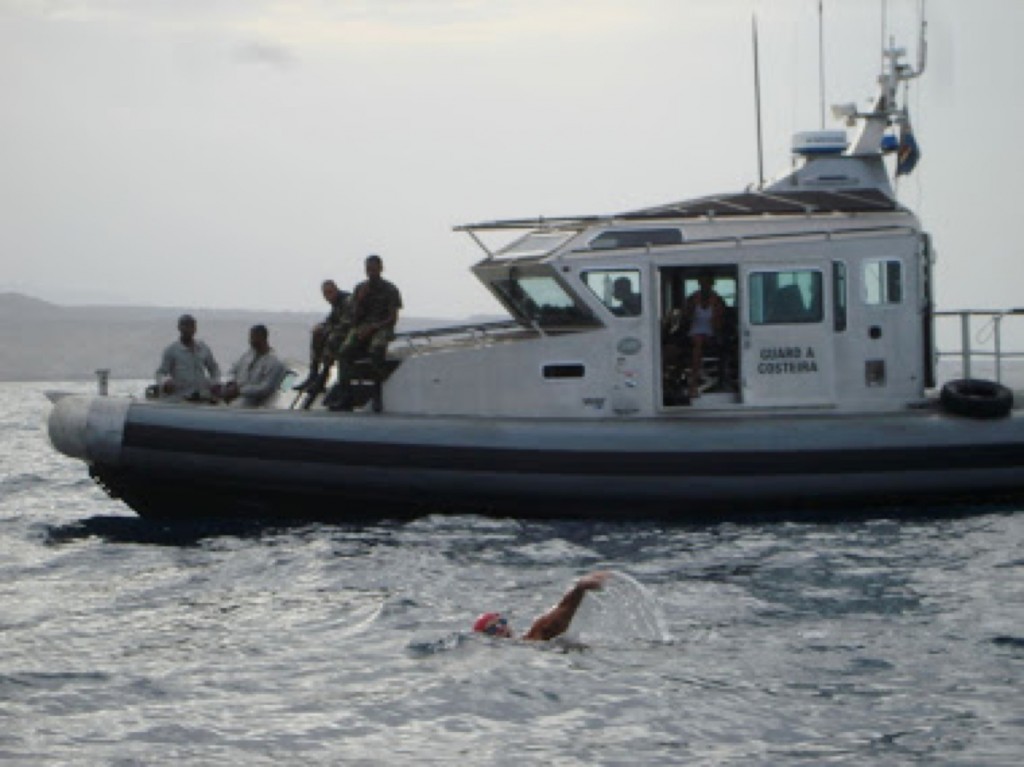
Cape Verde Coast Guard escorts David’s swim.
David Yudovin, an Honour Swimmer in the International Marathon Swimming Hall of Fame and a candidate for inclusion in the International Swimming Hall of Fame, continues to do unprecedented channel crossings around the world in his 60′s.
Yesterday, one of the world’s most prolific channel adventurers completed another tough crossing. This time, it was a 16 nautical mile (29.6 km) swim from the island of Maio to the island of Santiago in Cape Verdeoff the western coast of Africa.
“I was escorted by the Cape Verde Coast Guard and once again by Altino Goulart from the Azores. The swim took 11 hours 37 minutes under light wind conditions. This was a dream come true in Cape Verde.”
But Yudovin knows channel swimming is never completely easy. “The currents were extremely strong and mostly contrary and turbulent. It was a very, very challenging swim.”
He now has completed 3 unprecedented channel swims in Cape Verde: a 5 hour 44 minute 10.3 nautical mile swim across Canal de São Vicente between the islands of Santo Antão and the island of São Vicente, 12.5 nautical miles between Fogo and Brava in 6 hours 38 minutes, and this latest 11 hour 37 minute 16 nautical miles crossing between Maio and Santiago in 11 hours 37 minutes.
Cape Verde in Africa is an island country, spanning an archipelago of 10 islands located in the central Atlantic Ocean, 570 kilometres off the coast of Western Africa. The name of the country stems from the nearby Cap Vert, on the Senegalese coast, which in its turn was originally named “Cabo Verde” when it was sighted by Portuguese explorers in 1444, a few years before the islands were discovered. The previously uninhabited islands were discovered and colonized by the Portuguese in the 15th Century.
Six centuries later, the islands are now becoming discovered on another level by more and more open water swimmers including David Yudovin.
Copyright © 2013 by Open Water Swimming
Fogo Island to Brava Island, Cape Verde, Africa
Cape Verde, Africa
Santo Antonio Island to San Vincente Island. Cape Verde 2012
San Antonio to San Vincente Channel Swim
View News Video:
North Sumatra, Indonesia
October 20, 2011
Tanah Masa Island to Pini Island, North Sumatra, Indonesia
Video of Telo Island Swim

